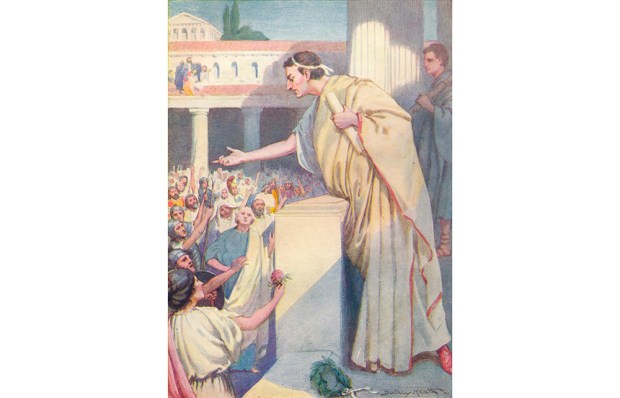The Labour party’s tagline for the forthcoming general election is: ‘For the many, not the few.’ Aristotle, who understood this as ‘For the poor, not the rich’, thought this a recipe for conflict and proposed a solution of which Mrs May would approve.
Suspicious of monarchy, Aristotle favoured two styles of constitution: oligarchy and democracy. The problem was that both systems ran the risk of creating an inherently unstable state. In a democracy, the poor would be in control by sheer weight of numbers; in an oligarchy, the rich would gain control (presumably) by sheer weight of influence. In either case, the two, at opposite ends of the spectrum, would be in perpetual conflict with each other, and the result would not be a just and well-governed state but its destruction.
For Aristotle, the ‘middle’ class was the answer. This, in the 4th century bc, referred to those citizens well enough off to be able to purchase the heavy armour that enabled them to serve as hoplites in the army —the ‘backbone’ of any state in that aggression-prone world — successful farmers and moderate property holders. While Aristotle attacked both the rich (‘full of contempt’) and poor (‘full of envy’) for the extremes to which their condition led them, he saw this ‘middle’ group as ‘free from factions’ and able to wield moderating influence between extremes.
It was ‘least reluctant to hold office but also least eager to do so’; it would be respected by both sides ‘because it does not covet others’ possessions, as the poor do, nor do others covert theirs’; and would function as the state’s centre of gravity, paying due attention to the interests and concerns of the extremes, but holding the ring between them. Nor would the extremes, out of hatred for each other, ever join up to make common cause against this ‘middle’ group, as it acted as the mediator between them and was a guarantor of stability — the primary concern of all ancient states.
So the Prime Minister is well-advised to look beyond her traditional supporters, however much they urge her to exploit Labour’s shambles and veer right.
Got something to add? Join the discussion and comment below.
Get 10 issues for just $10
Subscribe to The Spectator Australia today for the next 10 magazine issues, plus full online access, for just $10.
You might disagree with half of it, but you’ll enjoy reading all of it. Try your first month for free, then just $2 a week for the remainder of your first year.













Comments
Don't miss out
Join the conversation with other Spectator Australia readers. Subscribe to leave a comment.
SUBSCRIBEAlready a subscriber? Log in